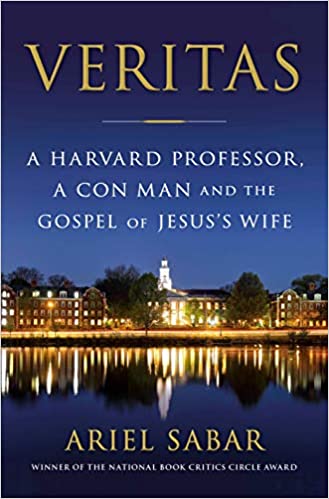Ariel Sabar masterfully dissects the dishonesty and narcissism inherent in nearly all Christian theological work in his book Veritas: A Harvard Professor, A Con Man and the Gospel of Jesus’s Wife.

Andover Hall at Harvard Divinity School. (Dariusz Jemielniak, CC BY-SA 4.0, Wikimedia Commons)
By Chris Hedges
ScheerPost.com
 No historical figure has been as manipulated, distorted and used for nefarious and self-serving ends as egregiously as Jesus Christ. Jesus has been trotted out over the past two millennia to justify a litany of evils including the Crusades, the Inquisition, the European conquest and genocide of the native peoples of the Americas, Puritan witch trials and the burning of heretics, slavery, the subjugation of women, the persecution of homosexuals, and, in the latest iteration, the endless wars in the Middle East.
No historical figure has been as manipulated, distorted and used for nefarious and self-serving ends as egregiously as Jesus Christ. Jesus has been trotted out over the past two millennia to justify a litany of evils including the Crusades, the Inquisition, the European conquest and genocide of the native peoples of the Americas, Puritan witch trials and the burning of heretics, slavery, the subjugation of women, the persecution of homosexuals, and, in the latest iteration, the endless wars in the Middle East.
Since there is so little known historically about Jesus, he is infinitely malleable. Every generation, and every brand of Christianity, has, for this reason, produced a Jesus in its own image. When I was a student at Harvard Divinity School, we read the German theologian Rudolf Bultmann, who, heavily influenced by Martin Heidegger, was an existentialist, and who, of course, turned Jesus into an existentialist.

Ariel Sabar. (Twitter)
The liberal church is as infected with this disease as right-wing Christians who have twisted Jesus into a Rambo-like white, male messiah for American capitalism, American imperialism, white supremacy and patriarchy. And it is this dishonesty and narcissism, inherent in nearly all Christian theological work, that Ariel Sabar masterfully dissects in his book Veritas: A Harvard Professor, A Con Man and the Gospel of Jesus’s Wife.
Karen King, a professor at Harvard Divinity School, made a startling announcement in September 2012 at a conference in Rome. She had obtained, she told the gathering, a second-century papyrus fragment with a text suggesting that Jesus was married to Mary Magdalene and that she was considered one of the disciples.
King called the fragment, the size of a business card, “The Gospel of Jesus’s Wife,” a clever marketing ploy, especially since it was impossible to know where the text, which turned out to be a crude forgery, came from. Even if it was real, it could have been nothing more than a tiny scrap of paper rolled up and worn in an amulet. But King, if nothing else, was media savvy, and “The Gospel of Jesus’s Wife” catapulted her “discovery” to international fame.
Please Support Our Summer Fund Drive!
She had already gotten a taste of popular acclaim, hitching herself to Dan Brown’s 2003 novel The Da Vinci Code, which was to Biblical scholarship what Raiders of the Lost Ark was to archeology. In the novel Brown makes Mary Magdalene the wife of Jesus, pregnant with Christ’s child when he was crucified. The Da Vinci Code was only a few degrees separated from the claims made by scholars like King, who published her book The Gospel of Mary Magdala: Jesus and the First Woman Apostle the same year as Brown’s novel.

Karen King. (Harvard Divinity School)
She instantly became a ubiquitous media presence, defending the novel despite its numerous Biblical and historical inaccuracies. “She appeared in cover stories about the book in Time, Newsweek and U.S. News & World Report and became a regular on Code-themed TV specials, on ABC’s Primetime, NBC’s Dateline and CNN Presents,” Sabar writes in Veritas.
In some of these media appearances she was joined by Brown. In the movie version, starring Tom Hanks, King is listed as a “consultant.” The novel transformed King from “a scholar whose intellectual passions had been confined to classrooms, academic tracts and the occasional church into a best-selling author with live audiences of hundreds and a television viewership of millions.” The Gospel of Jesus’s Wife returned her to the epicenter of popular culture and the mass media.
Mary Magdalene’s Role
King has spent her career championing the idea that Mary Magdalene and women in the early church played a prominent role in Jesus’ ministry. She is a scholar of gnostic texts, texts from the second to fourth centuries that did not make it into the church-approved canon. The Gnostics were condemned as heretics by the early church and their writings were banned.
The Gnostics believed that an elect group of believers, themselves, had been given a secret knowledge — the Greek word gnosis means knowledge of spiritual mysteries — about the divine status of human beings that was obscured by the Old Testament and revealed to them by Jesus, who was regarded as an illuminator rather than the resurrected savior.
The Gnostics were, as Sabar writes, “socially estranged, more open to women, less violent, more centered on the self,” a belief system that catered to the inwardly-focused zeitgeist of America’s consumer society. It appears from the fragments of the Gnostic texts that the sect included female leadership, something King explored, although often through very liberal interpretation, in The Gospel of Mary Magdala: Jesus and the First Woman Apostle.
King, as Sabar writes,
“placed a heavy burden on the Gospel of Mary. It didn’t matter that more than half of its pages were missing, obscuring its ultimate meanings. It didn’t matter that most scholars saw it as too late to compete with the canon. King, who titled her book The Gospel of Mary Magdala, even though the gospel nowhere identifies its ‘Mary’ as Magdalene, wanted the text to say things — and be things — that the available facts didn’t always support. In many fields, an incomplete one-of-a-kind data point might deter a scholar from making sweeping generalizations. But King went in precisely the opposite direction. She not only built ‘the history of Christianity’ atop the discontinuous surviving nine pages of a single text; she called its portrait of the faith’s first centuries ‘in a number of respects more historically accurate than that of the master story.”
From the beginning King obscured the origins of the fragment. She refused to disclose the identity of the donor. She did not show the scholars at the conference in Rome photographs of the text, as is customary in academic conferences.
She worked with the Smithsonian Channel to produce a documentary before the papyrus was analyzed and vetted. She eventually turned to close friends who lacked expertise to test the papyrus and authenticate the text. She openly dismissed the need for scientific testing, telling Sabar that chemical tests were “not usually done and not relevant.” Carbon dating, she said, “was too imprecise” and multispectral analysis — the imaging technique that can help identify erased or overwritten text — “wasn’t going to show anything.”
Rivaled by Christian Right
Her disdain for science and fact is only rivaled by the Christian right, which has also fallen prey to forgers. The billionaire evangelical owners of the Hobby Lobby, for example, have spent millions buying up Biblical artifacts to prove “the absolute authority and reliability of the Bible.” It is the flip side of King’s interpretation of the Bible. They were duped into buying fake Dead Sea Scroll fragments and a forged text, supposedly from Leviticus, condemning homosexuality.
When King’s claims were peer reviewed by two expert Coptic papyrologists in the Harvard Theological Review, they warned that the fragment was probably a fake. King used her clout with the publication to publish her findings without their critiques, leaning instead on one positive review by a friend who did not specialize in early Coptic Christian literature. Harvard University and The Harvard Theological Review, it turned out, were not immune to the media frenzy and the obfuscations needed to perpetuate it.
 Sabar’s dogged reporting uncovered not only King’s numerous schemes to pass the forgery off as real, but the identity of the forger, a German expatriate living in Florida named Walter Fritz who had a fake Egyptology degree, was a former director of the Stasi Museum in East Germany, and produced online pornographic videos of his wife having sex with multiple other men. The tissue of lies and deceit, from the hands of the forger up the chain to King and Harvard Divinity School, is staggering.
Sabar’s dogged reporting uncovered not only King’s numerous schemes to pass the forgery off as real, but the identity of the forger, a German expatriate living in Florida named Walter Fritz who had a fake Egyptology degree, was a former director of the Stasi Museum in East Germany, and produced online pornographic videos of his wife having sex with multiple other men. The tissue of lies and deceit, from the hands of the forger up the chain to King and Harvard Divinity School, is staggering.
Perhaps most disturbing is King’s apparent indifference to the truth, even once the text was unmasked as a forgery. She told Sabar she was “not particularly” interested in what he had uncovered, and that she did not realize that an object’s past could be studied.
“How could a historian, one at Harvard no less, have failed to see provenance as a subject to investigation?” Sabar asks. “Provenance, after all, was nothing more than history — King’s own scholarly discipline.”
King, like many academics, is infected with the disease of postmodernism. To them, there is no discernable, objective truth. Truth is a language game. It is determined by those who tell the best story. History is, they argue, a form of fiction. Facts, along with linear time, do not matter as long as the story told feels true and relevant.
History, King writes, “is not about truth but about power relations.” She argues that historians must abandon “the association between truth and chronology.” She calls for “reconceptualizing the Western construction of time” and sees history as “discontinuous and unpatterned.”
History, she writes, “is not serious, real or true.” History, she insists, is about “enlarging one’s imaginative universe” and never saying “no to a story, a song, a poem that gives life, heartens, teaches, or consoles, and need never fail to call it true.” She calls facts “little tyrannies.” Those bound by facts, she writes, are constricted by “fact fundamentalism.” She even concedes that Jesus’ marital status is finally unknowable, but also says this is irrelevant. As Sabar points out about King and the postmodernists, “a thing is true not if it is real; it is true if — in King’s estimation — it was a moral good.”
“In this view, every historical account — every piece of writing, for that matter — was a kind of stealthy sales pitch, a self-serving tale that promoted the interests of a particular individual or group,” Sabar writes. “The same held for reading. Whether Mary Magdalene was a prostitute or an apostle, for instance, turned less on ‘what happened’ than on which camp — pro-sinner or pro-saint — best publicized its interpretation.”
Sabar hits on something very important, the corruption and dishonesty of postmodern scholarship, the deforming of fact and history to serve ideologies and beliefs. King is a product of a collective of liberal, postmodern theologians known as the Jesus Seminar, which routinely sacrificed serious scholarship to advance a liberal interpretation of the Christian gospels, making them no different from the owners of the Hobby Lobby.
The group dismisses most of the sayings of Jesus in the Gospels as invented, writes off the entire Gospel of John as fiction and does not believe in miracles or the resurrection. But to advance the cause of feminism, it twisted itself into contortions to assert that the scene at the end of the Gospel of John, where Mary witnesses the resurrected Jesus, is a real-life version of an actual historical event.
“A group that set out to tell the public what Jesus really said and did had decided that a vision in a book it called false could be the basis for the reality of Magdalene’s witness to a resurrection that never happened,” Sabar writes.
A society that severs itself from discourse rooted in verifiable fact commits moral and intellectual suicide. Facts become indistinguishable from opinions. This war on truth, on science and on fact, whether from the liberal postmodern elites or the right-wing Christian fascists, widens the social divides. Believers on each side of the divide can no longer communicate.
A culture that disdains truth and fact rapidly calcifies and dies. It bifurcates, as I saw in the former Yugoslavia, into antagonistic warring tribes. This severance from reality fuels hate and finally violence. Competing demographics expend their energy demonizing the other.
This is the most important lesson in Sabar’s meticulous study of the dishonesty and moral corruption that is eating away at the heart of America. That this story was set at Harvard Divinity School is not surprising to those of us who have watched the liberal church fold in on itself and orchestrate its own irrelevance. It would be comforting if King was an anomaly. Unfortunately, she is not.
Chris Hedges is a Pulitzer Prize–winning journalist who was a foreign correspondent for 15 years for The New York Times, where he served as the Middle East bureau chief and Balkan bureau chief for the paper. He previously worked overseas for The Dallas Morning News, The Christian Science Monitor and NPR. He is the host of the Emmy Award-nominated RT America show “On Contact.”
This column is from Scheerpost, for which Chris Hedges writes a regular column. Click here to sign up for email alerts.
The views expressed are solely those of the author and may or may not reflect those of Consortium News.
Please Support Our
Summer Fund Drive!


I’m more worried about those who believe Earth itself is theirs alone to consume at whim without a thought of how much the gifts upon which we all depend everyday are being wasted.
The best account for the the wife of Jesus narrative comes from an order of Cathar nuns in France (http://laconneau.org/SeminarSyllabus1.html). They have a beautiful book called the Gospel of the Beloved Companion. Yes, the fragment Hedges speaks of is fake, but there is a separate “Gospel of Mary” with at least 4-5 full papyrus pages that was discovered in Egypt in the late 19th century. Yea, the Catholic church and gazillion Protestant branches did a lot of bad stuff over the centuries. And one can certainly question the mythology of Jesus’s divinity. And yes, the Bible is a hodgepodge mess which an unclear spiritual and historical narrative. BUT, Jesus of Nazareth DID have a ministry and there is ample evidence that Mary Magdalene was a disciple. Married or not? who cares? The wisdom in the parables of Jesus is groundbreaking in religious evolution from an anthropological point of view. We can study Lao Tzu, Confucius, Siddhartha Gautama for spiritual metaphysical wisdom… I don’t know why we can’t do the same with Jesus of Nazareth.
Anyone interested in how the story of Jesus was/is changed over the centuries to suit whatever story was most powerful at the time, have a look at Brian Griffith’s CORRECTING JESUS: 2000 YEARS OF CHANGING THE STORY. Cheers.
While I do have metaphysical beliefs, I have never believed in the vicarious atonement theory, or the inerrancy of the Bible and I find a physical resurrection unnecessary to the Christian message.
The Jesus seminar seems to have tried to fit Jesus to a non supernatural model. What does that leave? A set of ethics which are not unique. Why should he be more important than Plato? As for the Gospel of John being fiction, it was written some 60 years later in sophisticated Greek about events witnessed by illiterate Aramaic speaking fishermen and farmers. Much of John is speeches by Jesus delivering High Chistology. The seminar may have had a point.
I am an admirer of Chris Hedges but I only know what he doesn’t agree with. I feel a lot of theology makes little impact today because it is still tied to a pre Copernican world view.
In the last hundred years we have been given the concept of quantum States and Max Planck saying consciousness is intrinsic to the universe. We have, had extensive investigation of alleged post death communication and near death experiences. Also of states of consciousness, discussed in detail by the Dalai Lama and leading scientists in the field of neuroscience, psychology and similar fields. I have the impression that the debate is now at the point that we think the brain throws up inner experiences which are convincing to the experienced but are really just subjective brain stares OR they are indications of a wider reality which is almost beyond comprehension. Difficult though this is, I would suggest that this is the way ahead for religion, rather than trying to squeeze a few more drops out of two thousand year old texts..
Then there is one of the biggest from the Old Testament, The Exodus. The story wasn’t even written until the 6th century BCE. The author or authors clearly didn’t know the map of the region. Assuming Jews were enslaved in Egypt (not really a slave society, we know now), they couldn’t have escaped Egypt by going to the Sinai. That was all part of Egypt at the time, as was the territory all the way up the eastern side of the Mediterranean, past Damascus’ location. So that leaves out spending time in The Sinai and then taking over Canaan. It was all Egypt. Might as well escape the US by getting out of Houston and going to Dallas, spend a few decades there and then go to Memphis and conquering Memphis.
Then, there is the little matter that the pharaoh is never once named. Not once. Considering this character’s central role in the drama, that seems a bit strange. Old rule of literary analysis, fuzzy spots indicate what the author didn’t know and detail (which is provable) indicates what the author is most familiar with. The author or authors is/are most details, with names of kings, etc, about stories from the 6th/5th centuries BCE.
Then there is the little matter of all those genocidal massacres in Canaan. Poor old Jericho. Except that Jericho, one of the oldest cities, more than 9,000 years ago, and the wall shows no signs of any military defeat. Even so, the fall of Jericho and the massacre of every man, woman, child, animal, whatever is still celebrated. The only good thing is, it didn’t happened. The lousy thing is that these murders are celebrated, including in a great old gospel song. Next time you’re slapping your knee to a great song, think about the sentiment you are celebrating, genocide.
Make sure you read the Book of Joshua. There is an long string of boiler-plate city-state genocides, much like Jericho, everybody dead and after the account of glorious (good-side) slaughter there is the statement that God wanted this. Good ol’ God.
Of course, stories are state propaganda, designed for a purpose. Then about getting free of Babylon and captivity. Later, including now, including the Zionists and creation of modern Israel, the purpose of justifying modern Israel and the removal, by any means of Palestinians, almost 800,000 in 1948.
It was a fraud 2600 years ago and a fraud in 1948 and in the late 1800’s when Zionism got going.
Of course that also means that the Passover never happened. Try and free people from that one.
Adding:
Apologies, a couple of typos above.
One more item in the chronology. The Battle of Kadesh in 1274 BCE between Egyptian and Hittite forces. Kadesh was north of Damascus and the Egyptians were stopping the Hittites at that point.
Google for maps of the New Kingdom of Egypt which covers this time (as claimed in the story) – about 1400 – 1000 BCE. Which is another problem about the fuzziness of things not really known to the author(s). That is pretty large time period to not be able to specify better who and when. Just too many holes, big, massive, galaxy-size holes.
Also, it was hardly a feat to get out of Egypt. The route between Africa and the areas east had been traken in both directions by humans for tens, maybe hundreds of thousands of years for trade and migrations.
Entropy, in the form mice, mildew, fires, have destroyed nearly all records from the Roman Empire. Many famous people left even fewer contemporary records than Jesus. Alexander the Great is one examle. Ptolemy the astronomer is another.
If readers have enjoyed Hedges’article, readers might like these classics, too.
Zhu Bajie
Modern Apocrypha: Famous “Biblical” Hoaxes, by Edgar Johnson Goodspeed Hardcover – January 1, 1956
Strange tales about Jesus: A Survey of Unfamiliar Gospels, by Per Beskow (1983-05-03)
Most ancient documents have fallen prey to mice, mildew, entropy in a general way. We have fewer contemporary records of Alexander the Great or Ptolemy the astronomer than we do for Jesus. Most are not recorded at all.
Pretty good!
I’ve always liked the “Jesus was a hallucinogenic mushroom” theory of John Marco Allegro!
“They were duped into buying fake Dead Sea Scroll fragments and a forged text, supposedly from Leviticus, condemning homosexuality.”
Chris –
No need to resort to fake scrolls or forged text. Every major translation of the Bible contains the homophobic Leviticus verse:
“If a man lies with a male as with a woman, both of them have committed an abomination; they shall surely be put to death; their blood is upon them” [Leviticus, Chapter 20 verse 13, KJV].
We are quite sure Hedges knows this Leviticus quote, and it is besides the point. Your comment appears to be nitpicking, a pulling at straws, to undermine the argument of the entire article.
Important article.
Amazing that a professor basing her research on a forgery and showing contempt for truth and the scientific method – as described by Chris Hedges – is allowed to teach at Harvard.
At the same time that one of our greatest current political thinkers and intellectuals, Cornel West, is denied tenure at the same institution, apparently in retribution for his defending the Palestinians.
Sad…
Actually, I’ve often wondered why we have no record of Christ from the Romans, they were as fanatical about keeping records as the Germans. Part of the reason for the ruination of Christianity, I’ve always thought was that they missed out on the “new” testament part. It’s a whole NEW testament, people, not an additional testament. I suspect the original intent was to relocate the “old” testament in the circular file.
Actually there was a record of Jesus from the Romans – Jesus was mentioned twice in the “Antiquities of the Jews” by the late 1st century historian Flavius Josephus (which references were apparently later somewhat redacted).
Also, I don’t agree with Jeff Harrison that the “original intent was to relocate the ‘old’ testament in the circular file”. Quite the opposite, as the “new” testament makes clear: “Think not that I am come to destroy the law, or the prophets: I am not come to destroy, but to fulfil.” (Matthew 5:17)
In his good article, Chris Hedges however goes too far in finding “dishonesty and narcissism inherent in nearly all Christian theological work,” on the basis of the one case of academic dishonesty he described. Despite the frequent misuse of religion and religious texts, there are certainly scholars who respect facts and legitimate sources.
Regarding the cases of the cited Harvard Divinity School professor (described by C. Hedges as using fraudulent research) and of Cornel West (denied tenure despite stellar credentials, apparently on the basis of support for the Palestinian cause), there is a similarity – the Divinity School professor advancing the ideological “cause” of identity politics; West defying the ruling ideology regarding Middle East politics. Harvard sadly appears to be putting ideology above truth. Turning its back on its venerable motto “VERITAS”. Unless it finds its way back to its roots, the school should change its motto to “FALSITAS” (Latin for untruth, fraud, deceit).
I don’t agree that Christ is mentioned by the Romans. Flavius Josephus is not a contemporary reference by any means. Josephus was himself a Jew and hardly contemporary with Christ. Like I said, there is no record of Christ from the Romans.
I also didn’t intend the relocation to the circular file to mean destroy the old testament; rather it was to make it irrelevant because it has all been fulfilled. The reality is that there is so much disagreement between the old and new testament, it’s hard to believe that anyone could actually take your position. The classic is the scene in the new testament where Christ intervenes in the stoning of an adulteress and says the classic line let he who is without sin cast the first stone. The old testament prescribes stoning for adultery. Clearly Christ denied it. How can you keep both?
While I thoroughly agree with Chris Hedges argument about the way Christianity and Jesus have been twisted constantly over the entire history of this religion and I particularly agree with his dismissal of Karen King, I would like to read Chris’s comment on the Cathars. This group from southern France has for centuries believed that Joseph of Arimathea (sp?) a friend of Jesus, brought Mary Magdalene and Jesus (after he was risen) to southern France where they settled in as a family and some French families say they can trace their lineage to this family. During and after the crusades members of this group were attacked by the Catholic church’s knights and virtually all of their large chateaus and palaces were destroyed. At least that is the story told in France to explain why so many walled castles and chateaus were burned and otherwise destroyed during that period. I have been there and seen that.
I mention this, because the belief that Jesus married Magdalene is a very old belief and not one thought up in recent centuries. Also I think it quite possible that that is true. Perhaps Jesus didn’t come along, but she might have come to south France with Joseph and it is entirely possible that she was pregnant. The ancient fragment doesn’t seem likely. If Magdalene were to write, it would be in France, but it seems unlikely that she would have written at all. It is more likely that she could not write.
A very unlikely story, though one should never underestimate the unbelievable suffering of the massacred Cathars.
Here in Somerset, in the south west of England, we have the story of Joseph of Arimathea coming to Britain with a teenage Jesus, who builds a wattle and daub church, at Glastonbury. He consorted with the Druids and learnt their ancient wisdom. At this time Britain had a tin trade between Cornwall and the rest of Europe but it was, not in the Roman Empire.
The legends seem to emerge in the Middle Ages and add the legends of King Arthur. Wonderful stories as they are, there is little or no evidence.
Since Hedges obtained a Master in Divinity from that self-same Harvard Divinity School, it is very understandable that he should be especially upset by this sort of shenanigans taking place there. But for someone with a more detached view, it comes as no great surprise. Corruption has become characteristic of Harvard; why should the Divinity School be different?
people without the vaguest understanding of present reality can be forgiven for swallowing stories about who said-did-thought what about the origins of life, santa claus, the marketplace, democracy, fascisism and other representations of climate change, capitalism, etc. calling any of the massive conjecture about what happened thousands of years ago among individuals “factual” because one or another hustler with degrees in deep as opposed to more shallow interpretations of what might as well be revelatons from the beings in UFOs is a stretch. whether mary, magdalene or schwartz or liparullo, existed in whatever form or role she – or maybe she was trans? or bi? -took can only be important to those who make a living selling stories at the market or peddling them at the temple, mosque, church or political rally.
As always, excellent analysis by Chris Hedges. It’s funny how Jacques Derrida opened up a whole industry of reimagining basic texts of the literary canon as non-textual blunders without any meaning, except those meanings which new generations might need them to have. Yet our entire, global economy is based on a casino mathematics in which the only true reality is that of profit without reference to any other acceptable reality. The late nineteenth century discovery of a discontinuous universe wasn’t intended to qualify the alchemy of a prejudiced outcome into a “greater” reality.
Where I used to live I could listen to right-wing AM radio and sure enough, there was a stock market show encouraging those Christians to invest in the stock market and make profits through them. Their pitch was the bible says you are to be prosperous.